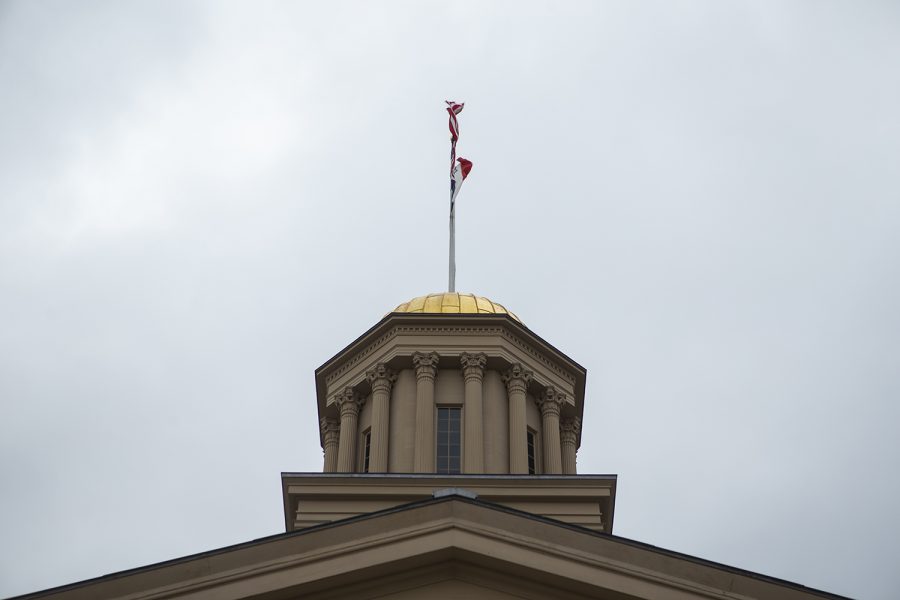University of Iowa fall plans spark concern for UI faculty and graduate students
Faculty and staff are voicing opposition to and personal concern around the resumption of partial in-person instruction in the fall 2020 semester.
The Old Capitol is seen on Thursday, March 12, 2020. (Jenna Galligan/The Daily Iowan)
July 12, 2020
While the University of Iowa plans to return to in-person instruction for the fall semester, some faculty and staff have expressed concerns that the social distancing guidelines created by the UI will not be enough to keep instructors and students safe.
Thirty-seven University of Iowa faculty members signed an open letter to UI students, which was published in the Cedar Rapids Gazette on the first of the month and later in The Daily Iowan. The writers shared concerns about recent budget cuts that have led some lecturers to be fired, which could result in larger classes and excess work for remaining faculty and staff.
In the letter, the faculty and staff members wrote that the guidelines outlined for the upcoming fall semester by the UI, such as 6 feet of spacing in classrooms and in-person instruction in classroom spaces that accommodate for twice the number of students, aren’t possible.
Associate Professor of Political Science Cary Covington was not one of the faculty members to sign the letter.
“I think there’s no question that face-to-face interaction with students and faculty is much better for the student,” Covington said. “I think back and forth — give and take — is crucial, particularly in a liberal-arts education.”
Covington said he wasn’t surprised by the UI’s decision, and he appreciates the university administration’s openness to adapting the plan. He said he does not feel comfortable returning to campus in the fall semester, however.
RELATED: Students expected to sign agreement to comply with COVID-19 guidelines in fall semester
By the end of the 2020-21 academic year, Covington will be 70 years old. He has also been diagnosed with diabetes — both factors make him especially vulnerable to adverse effects of COVID-19.
“Those two health factors, risk factors, made it just too much risk for me in my mind, to be in a situation where even if the classroom was arranged for distancing and masks and so on … going into the office, out of the office, going to class, going back to my house — there would just be too many interactions that would be too risky given the outcomes associated with diabetes and older ages,” he said.
Covington is taking a phased retirement, and the fall 2020 semester is his last as a regular, full-time faculty member. Personal concern about finding a safe, sanitized place to live in addition to his existing risk factors led Covington to the decision to teach virtually from his new home in California — closer to his grandchildren.
Covington said his classes have less than 50 students in each and his request for virtual instruction still needs to be approved by the college, however, his department head was supportive of his choice.
Teaching assistants have also voiced concerns about the fall plan. Inga Popovaite, a sociology and criminology graduate student from Lithuania, said she has worked previously as a TA and will be a research assistant in the fall.
RELATED: UI outlines further budget cuts, president’s salary proposed to be cut in half
International graduate students are facing a conundrum in regard to in-person class, she said.
“As a graduate worker, I’m very opposed to in-person classes and also as an international student, I understand that I need those classes to stay here,” Popovaite said.
Anthropology graduate student Caleb Klipowicz will be a TA in “Contemporary World Problems” in the fall.
Klipowicz, who said he would prefer all classes be online, said the university’s plans for social distancing during in-person classes put an extra burden on TAs.
He said that putting graduate students in this situation is indicative of a larger pattern of graduate students being an afterthought for the university. He also noted that there are no guidelines in place for TAs to ensure students follow the rules and adhere to social distancing and other health safety guidelines in the classroom.
“[UI President Bruce Harreld] is like, ‘Well people will just wear masks, and they will stay 6 feet apart’ and that was it,” Klipowicz said. “So, I ask a question, ‘What if someone refuses? What if someone says no?’ So if you’re in that situation as a TA, there’s no infrastructure in place for how you handle that.”






